Is there an exhaustive list of all of the "base" (not used in an object-oriented sense but more in a common sense) generic types in the 4.0 .NET Framework? I have found this list that I often send newer/mid-level devs to so they can understand how non-generic types map to generic types, but this is by no means exhaustive. I'm looking for something that also includes things such as KeyValuePair<>, Tuple<>, and other basic generics that may not be very-well known. Interfaces such as IObservable<> would be nice but not necessarily required.
- 13,081
- 8
- 83
- 125
-
Maybe we could write all the generics we suppose useful as answers below? And you would generate list of types from answers? – The Smallest Nov 29 '10 at 21:16
-
Unfortunately, what you're asking for needs to be better defined. `KeyValuePair<>` and `Tuple<>` aren't collection types (though `KeyValuePair` is closely associated with `Dictionary<>`). `IObservable` is also not a collection interface, though `ObservableCollection
` does make use of it. Do you want types like `IQueryable`, which don't represent a collection but a repository (of undefined size) that you can run queries against? – Adam Robinson Nov 29 '10 at 21:30
6 Answers
Here's a powershell fragment to list all the generic types in the system assemblies
[AppDomain]::CurrentDomain.GetAssemblies() |
? { $_.FullName -match "^System" -or $_.FullName -match "mscorlib"} |
% { $_.GetTypes() | ? { $_.ContainsGenericParameters } }
This could be adapted to give a more comprehensive list. If you load powershell w/ a .Net 4 config, you'll get the 4.0 list.
Count Name
----- ----
1 System.Xml
12 System.Data
67 System
187 mscorlib
325 System.Core
- 1
- 1
- 18,890
- 14
- 78
- 115
In Visual Studio open the object explorer, choose .NET 4 Framework, search for IEnumerable<T> and expand the list of derived types. It's way too much to paste here :-).

- 19,405
- 5
- 46
- 65
You could reflect on all the BCL assemblies and use the IsGenericType method to get a list of generic types.
- 1,003
- 2
- 7
- 13
You can find this in the System.Collections.Generic namespace http://msdn.microsoft.com/en-us/library/system.collections.generic.aspx
- 9,599
- 2
- 36
- 38
-
It is not full, there are other types and interfaces like IQueryable
in other namespaces and assemblies. – The Smallest Nov 29 '10 at 21:20
This should give you some answers:
The System.Collections.Generic namespace provides most of the generic collections that we already know from .NET 3.5. There was already providing three thread-safe collections:
- SynchronizedCollection Class;
- SynchronizedKeyedCollection Class;
- SynchronizedReadOnlyCollection Class.
The System.Collections.Concurrent namespace namespace provides thread-safe generic collections.
- 23,773
- 22
- 96
- 162
Here's my code. Add more assemblies as you desire.
static void Main(string[] args)
{
Assembly[] assemblies = new Assembly[] {
typeof(string).Assembly,
typeof(Uri).Assembly,
typeof(System.Linq.Enumerable).Assembly};
List<string> final = new List<string>();
Debug.WriteLine("Checked assemblies: ");
foreach (Assembly assembly in assemblies)
{
Debug.WriteLine(assembly.FullName);
Type[] types = assembly.GetTypes();
IEnumerable<Type> genericTypes = types.Where(t => t.IsGenericType && t.IsPublic);
foreach (Type t in genericTypes)
{
final.Add(t.FullName);
}
}
final.Sort();
Debug.WriteLine("Generic classes: ");
foreach (string s in final)
{
Debug.WriteLine(s);
}
}
Results:
- Checked assemblies:
- mscorlib, Version=4.0.0.0, Culture=neutral, PublicKeyToken=b77a5c561934e089
- System, Version=4.0.0.0, Culture=neutral, PublicKeyToken=b77a5c561934e089
System.Core, Version=4.0.0.0, Culture=neutral, PublicKeyToken=b77a5c561934e089
Generic classes:
- System.Action`1
- System.Action`10
- System.Action`11
- System.Action`12
- System.Action`13
- System.Action`14
- System.Action`15
- System.Action`16
- System.Action`2
- System.Action`3
- System.Action`4
- System.Action`5
- System.Action`6
- System.Action`7
- System.Action`8
- System.Action`9
- System.ArraySegment`1
- System.Collections.Concurrent.BlockingCollection`1
- System.Collections.Concurrent.ConcurrentBag`1
- System.Collections.Concurrent.ConcurrentDictionary`2
- System.Collections.Concurrent.ConcurrentQueue`1
- System.Collections.Concurrent.ConcurrentStack`1
- System.Collections.Concurrent.IProducerConsumerCollection`1
- System.Collections.Concurrent.OrderablePartitioner`1
- System.Collections.Concurrent.Partitioner`1
- System.Collections.Generic.Comparer`1
- System.Collections.Generic.Dictionary`2
- System.Collections.Generic.EqualityComparer`1
- System.Collections.Generic.HashSet`1
- System.Collections.Generic.ICollection`1
- System.Collections.Generic.IComparer`1
- System.Collections.Generic.IDictionary`2
- System.Collections.Generic.IEnumerable`1
- System.Collections.Generic.IEnumerator`1
- System.Collections.Generic.IEqualityComparer`1
- System.Collections.Generic.IList`1
- System.Collections.Generic.ISet`1
- System.Collections.Generic.KeyValuePair`2
- System.Collections.Generic.LinkedList`1
- System.Collections.Generic.LinkedListNode`1
- System.Collections.Generic.List`1
- System.Collections.Generic.Queue`1
- System.Collections.Generic.SortedDictionary`2
- System.Collections.Generic.SortedList`2
- System.Collections.Generic.SortedSet`1
- System.Collections.Generic.Stack`1
- System.Collections.ObjectModel.Collection`1
- System.Collections.ObjectModel.KeyedCollection`2
- System.Collections.ObjectModel.ObservableCollection`1
- System.Collections.ObjectModel.ReadOnlyCollection`1
- System.Collections.ObjectModel.ReadOnlyObservableCollection`1
- System.Comparison`1
- System.ComponentModel.BindingList`1
- System.Converter`2
- System.EventHandler`1
- System.Func`1
- System.Func`10
- System.Func`11
- System.Func`12
- System.Func`13
- System.Func`14
- System.Func`15
- System.Func`16
- System.Func`17
- System.Func`2
- System.Func`3
- System.Func`4
- System.Func`5
- System.Func`6
- System.Func`7
- System.Func`8
- System.Func`9
- System.IComparable`1
- System.IEquatable`1
- System.IObservable`1
- System.IObserver`1
- System.Lazy`1
- System.Linq.EnumerableExecutor`1
- System.Linq.EnumerableQuery`1
- System.Linq.Expressions.Expression`1
- System.Linq.IGrouping`2
- System.Linq.ILookup`2
- System.Linq.IOrderedEnumerable`1
- System.Linq.IOrderedQueryable`1
- System.Linq.IQueryable`1
- System.Linq.Lookup`2
- System.Linq.OrderedParallelQuery`1
- System.Linq.ParallelQuery`1
- System.Nullable`1
- System.Predicate`1
- System.Runtime.CompilerServices.CallSite`1
- System.Runtime.CompilerServices.ConditionalWeakTable`2
- System.Runtime.CompilerServices.ReadOnlyCollectionBuilder`1
- System.Runtime.CompilerServices.RuleCache`1
- System.Runtime.CompilerServices.StrongBox`1
- System.Security.AccessControl.AccessRule`1
- System.Security.AccessControl.AuditRule`1
- System.Security.AccessControl.ObjectSecurity`1
- System.Threading.Tasks.Task`1
- System.Threading.Tasks.TaskCompletionSource`1
- System.Threading.Tasks.TaskFactory`1
- System.Threading.ThreadLocal`1
- System.Tuple`1
- System.Tuple`2
- System.Tuple`3
- System.Tuple`4
- System.Tuple`5
- System.Tuple`6
- System.Tuple`7
- System.Tuple`8
- 27,383
- 4
- 60
- 93